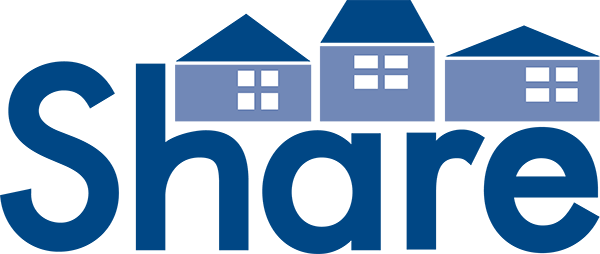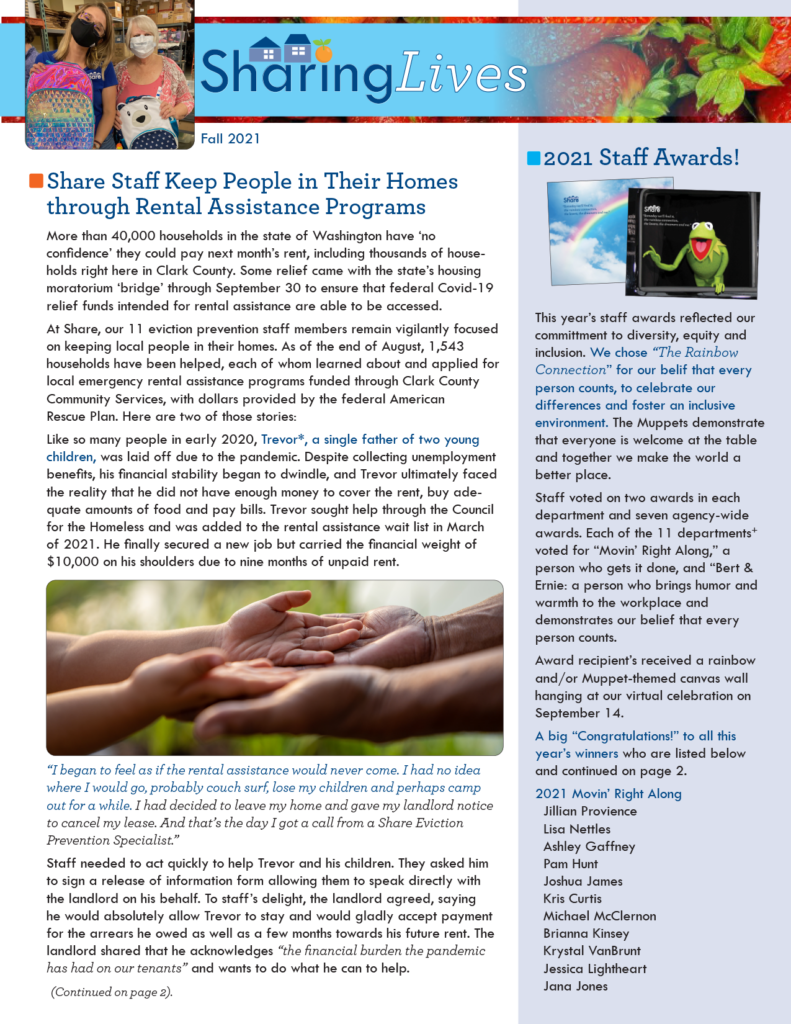Share Staff Keep People in Their Homes through Eviction Prevention Programs
More than 40,000 households in the state of Washington have ‘no confidence’ they could pay next month’s rent, including thousands of households right here in Clark County. Some relief came with the state’s housing moratorium ‘bridge’ through September 30 to ensure that federal Covid-19 relief funds intended for eviction prevention are able to be accessed.
At Share, our 11 eviction prevention staff members remain vigilantly focused on keeping local people in their homes. As of the end of August, 1,543 households have been helped. Here are two of those stories:
Like so many people in early 2020, Trevor*, a single father of two young children, was laid off due to the pandemic. Despite collecting unemployment benefits, his financial stability began to dwindle, and Trevor ultimately faced the reality that he did not have enough money to cover the rent, buy adequate amounts of food and pay bills.
Trevor sought help through the Council for the Homeless and was added to the eviction prevention wait list in March of 2021. He finally secured a new job but carried the financial weight of $10,000 on his shoulders due to nine months of unpaid rent.“I began to feel as if the assistance would never come. I had no idea where I would go, probably couch surf, lose my children and perhaps camp out for a while. I had decided to leave my home and gave my landlord notice to cancel my lease. And that’s the day I got a call from a Share Eviction Prevention Specialist.”
Staff needed to act quickly to help Trevor and his children. They asked him to sign a release of information form allowing them to speak directly with the landlord on his behalf. To staff’s delight, the landlord agreed, saying he would absolutely allow Trevor to stay and would gladly accept payment for the arrears he owed as well as a few months towards his future rent. The landlord shared that he acknowledges “the financial burden the pandemic has had on our tenants” and wants to do what he can to help.
Charles* and Eva*, both immigrants and parents of their two children, were both employed full time and heavily invested in the gig economy (flexible jobs, such as handyman, rideshare driving, food delivery, etc.). At the onset of the pandemic, their work and source of income stopped almost overnight.
While Charles has pre-existing health conditions, including severe asthma which prevented him from working in most service jobs, he found inconsistent work as a carpenter; this work helped to keep food on their table. Transportation issues compounded their inability to find full-time employment.
They continued to pay rent in small amounts, but ultimately were 12 months behind in payments. Then they learned about and applied for local emergency eviction prevention programs funded through Clark County CommunityServices, with dollars provided by the federal American Rescue Plan.
When Share staff called their home, they used an interpreter, Marie, who was able to communicate the family’s dire situation. Eva was overcome with emotion, with a fear of homelessness in a country where they had no family or support network. “She told me that she would do anything to keep her children from becoming homeless,” shared Marie.
Staff worked directly with their landlord, who noted that Charles and Eva were longtime tenants who had never missed a payment before the pandemic. “They are hardworking, compassionate and full of integrity,” she said. The landlord accepted the back payment of $15,000 in rent, allowing the family to stay in their home. Charles found consistent work and set up a payment plan with their landlord for future payments.
“We are incredibly grateful for this second chance,” said Eva.
*Names changed to preserve anonymity.



